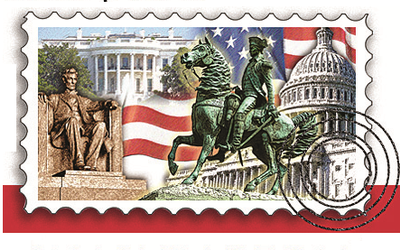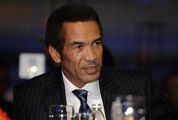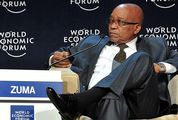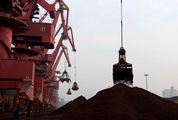LETTER FROM AMERICA: ANC discussion papers are a bad joke, right?
by Simon Barber,
2015-08-27 05:55:02.0
ARE we supposed to take seriously the international relations chapter of the African National Congress’s (ANC’s) national general council discussion documents?
I ask this remembering a conversation I had with the great Charlie Rangel, he of the Rangel Amendment, which stopped US companies deducting taxes paid to the government of PW Botha from what they owed Uncle Sam. The Congressman from Harlem and I spoke at the 1988 Democratic convention in Atlanta. The platform the party adopted for its presidential nominee Michael Dukakis to run on that year pledged a nigh hermetic embargo of SA, well beyond the 1986 Comprehensive Anti-Apartheid Act and Rangel’s own initiative.
"For real?" I asked. He laughed. "Goodness, no! Nobody pays the slightest attention to the platform." Platforms, he intimated, were things to keep party activists happy and out of the grownups’ hair. Here’s hoping the same is true of the ANC’s national general council discussion documents, certainly as they relate to foreign policy.
With some editing, the section titled "Characterisation of the world today" might scrape a "C" as an undergraduate essay. Otherwise, it is laughable. The typos, the solecisms of grammar and syntax, the malapropisms (the global economy is said to be "buttressed by the worse (sic)" economic crisis since the 1930s) and general linguistic flatulence one may charitably attribute to English not being the first language of every cadre who had a hand in the drafting.
As for the substance, it is the stuff of ideological folk memory and magical thinking, guided, unapologetically, by the half-digested theories of the very late Vladimir Lenin while unencumbered by much understanding or first-hand experience of the world as it is, a century on. Especially quaint is the assertion that the US has "declared a cold war" against China and Russia and is seeking to "destabilise" them.
Not so long ago, when SA’s democracy was still independent and largely unsold, its ANC leaders proudly positioned the country as an interlocutor and constructive engager, the better to leverage its own and Africa’s cause at all points of the geopolitical compass. To the extent that their struggle-era loyalties lay more with the communist East than the pluralist West, they contrived, for practical purposes, to bite their tongues and choke back outmoded epithets such as "imperialist". Now, it would seem, in pathetic gratitude for being allowed to represent Africa in the Brics (Brazil, Russia, India, China and SA), even though SA is no longer the largest sub-Saharan economy, the ANC has become a propagandist more imperial than the emperor in taking Beijing’s part against Washington.
For the party of Nelson Mandela to denounce the US and its "ideological apparatus" for sympathising with the 1989 Tiananmen Square protest is disgusting. To belittle as US-driven the concerns that China’s neighbours have about its regional ambitions is, stupidly, to risk alienating those neighbours. Their fears are theirs, not US figments. To say that the US "is bent on portraying China as the world’s worst polluter" in order to "suggest that China is but a paper tiger whose economic rise is not sustainable" is simply ignorant.
Next month, presidents Barack Obama and Xi Jinping will, in the words of the Washington Post, "celebrate their shared commitment to curtailing greenhouse gas emissions" when the former welcomes the latter to the White House. They will have a lot to talk about, but you can be certain that neither of them will be giving a moment’s thought to SA, an economy the size of Maryland, a small US state, or the ANC.
For my money, the uber-obscene paragraph in the "Characterisation of the world today" is a defence of Russian President Vladimir Putin’s creeping anschluss of the Ukraine that could have been copied and pasted from his own official agitprop. The Putin regime, it has been well-documented, is a criminal enterprise. It murders journalists. It stifles dissent. It stirs up red-in-tooth-and-nail ethnic nationalism. It promotes hate. It is the essence of what many South Africans died fighting against.
The ANC, the national general council discussion documents suggest, is spreading its lower limbs to China and Russia as SA’s hegemons, which is just another word for colonial masters. For what? A simpleton’s trust that a Chinese-led bank will be quicker to lend to uneconomic, incompetently managed projects than the World Bank? Or is it straight cash the party is after? Please say the national general council documents are as vacuous as a US party platform.
• Barber is a freelance journalist

Letter from Washington
ARE we supposed to take seriously the international relations chapter of the African National Congress’s (ANC’s) national general council discussion documents?
I ask this remembering a conversation I had with the great Charlie Rangel, he of the Rangel Amendment, which stopped US companies deducting taxes paid to the government of PW Botha from what they owed Uncle Sam. The Congressman from Harlem and I spoke at the 1988 Democratic convention in Atlanta. The platform the party adopted for its presidential nominee Michael Dukakis to run on that year pledged a nigh hermetic embargo of SA, well beyond the 1986 Comprehensive Anti-Apartheid Act and Rangel’s own initiative.
"For real?" I asked. He laughed. "Goodness, no! Nobody pays the slightest attention to the platform." Platforms, he intimated, were things to keep party activists happy and out of the grownups’ hair. Here’s hoping the same is true of the ANC’s national general council discussion documents, certainly as they relate to foreign policy.
With some editing, the section titled "Characterisation of the world today" might scrape a "C" as an undergraduate essay. Otherwise, it is laughable. The typos, the solecisms of grammar and syntax, the malapropisms (the global economy is said to be "buttressed by the worse (sic)" economic crisis since the 1930s) and general linguistic flatulence one may charitably attribute to English not being the first language of every cadre who had a hand in the drafting.
As for the substance, it is the stuff of ideological folk memory and magical thinking, guided, unapologetically, by the half-digested theories of the very late Vladimir Lenin while unencumbered by much understanding or first-hand experience of the world as it is, a century on. Especially quaint is the assertion that the US has "declared a cold war" against China and Russia and is seeking to "destabilise" them.
Not so long ago, when SA’s democracy was still independent and largely unsold, its ANC leaders proudly positioned the country as an interlocutor and constructive engager, the better to leverage its own and Africa’s cause at all points of the geopolitical compass. To the extent that their struggle-era loyalties lay more with the communist East than the pluralist West, they contrived, for practical purposes, to bite their tongues and choke back outmoded epithets such as "imperialist". Now, it would seem, in pathetic gratitude for being allowed to represent Africa in the Brics (Brazil, Russia, India, China and SA), even though SA is no longer the largest sub-Saharan economy, the ANC has become a propagandist more imperial than the emperor in taking Beijing’s part against Washington.
For the party of Nelson Mandela to denounce the US and its "ideological apparatus" for sympathising with the 1989 Tiananmen Square protest is disgusting. To belittle as US-driven the concerns that China’s neighbours have about its regional ambitions is, stupidly, to risk alienating those neighbours. Their fears are theirs, not US figments. To say that the US "is bent on portraying China as the world’s worst polluter" in order to "suggest that China is but a paper tiger whose economic rise is not sustainable" is simply ignorant.
Next month, presidents Barack Obama and Xi Jinping will, in the words of the Washington Post, "celebrate their shared commitment to curtailing greenhouse gas emissions" when the former welcomes the latter to the White House. They will have a lot to talk about, but you can be certain that neither of them will be giving a moment’s thought to SA, an economy the size of Maryland, a small US state, or the ANC.
For my money, the uber-obscene paragraph in the "Characterisation of the world today" is a defence of Russian President Vladimir Putin’s creeping anschluss of the Ukraine that could have been copied and pasted from his own official agitprop. The Putin regime, it has been well-documented, is a criminal enterprise. It murders journalists. It stifles dissent. It stirs up red-in-tooth-and-nail ethnic nationalism. It promotes hate. It is the essence of what many South Africans died fighting against.
The ANC, the national general council discussion documents suggest, is spreading its lower limbs to China and Russia as SA’s hegemons, which is just another word for colonial masters. For what? A simpleton’s trust that a Chinese-led bank will be quicker to lend to uneconomic, incompetently managed projects than the World Bank? Or is it straight cash the party is after? Please say the national general council documents are as vacuous as a US party platform.
• Barber is a freelance journalist





















Change: -2.60%
Change: -2.88%
Change: -2.44%
Change: -2.44%
Change: -5.26%
Data supplied by Profile Data
Change: 0.00%
Change: 0.00%
Change: -2.60%
Change: 0.00%
Change: 0.00%
Data supplied by Profile Data
Change: 1.98%
Change: -0.06%
Change: -0.19%
Change: -0.09%
Change: 0.57%
Data supplied by Profile Data
Change: 0.00%
Change: 0.00%
Change: 0.00%
Change: 0.00%
Change: 0.00%
Data supplied by Profile Data